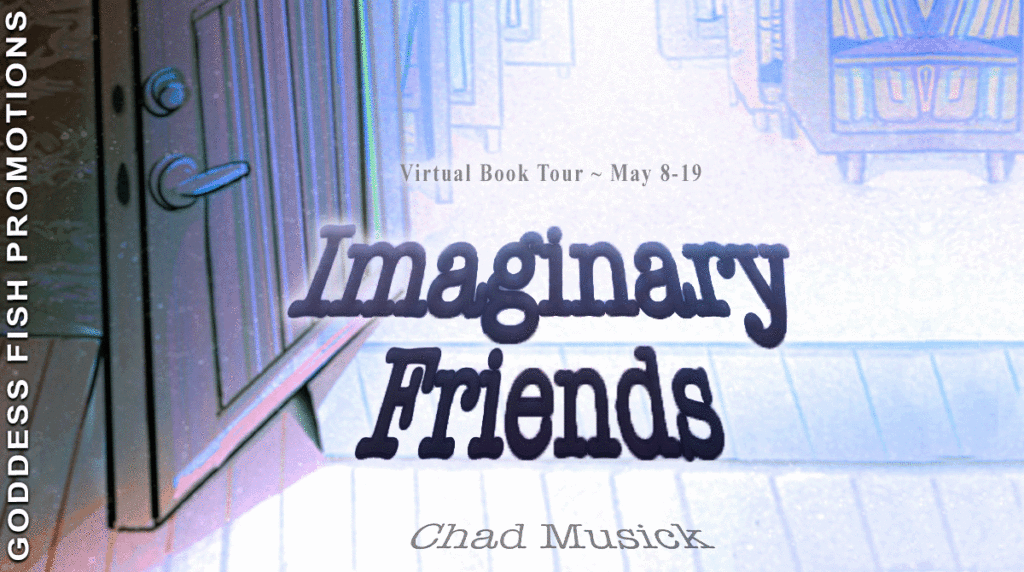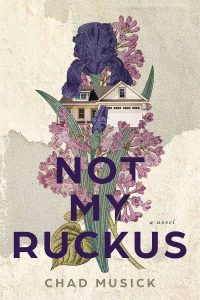This post is part of a virtual book tour organized by Goddess Fish Promotions. Chad Musick will be awarding a $10 Amazon or Barnes and Noble GC to a randomly drawn winner via rafflecopter during the tour. Click on the tour banner to see the other stops on the tour.
If the delivery had been a demonic bowling alley or a mermaid’s grotto, Ivy would have sent it away. She has standards, after all. But she can’t refuse a magical Library, especially when they’ve gone to the trouble of including a wheelchair ramp. They say that on the Internet nobody knows you’re a dog, but somebody knows fourteen-year-old Ivy is an orphan, that she sells her paper-writing services to lazy college students, and that her imaginary friends are unhappy being stuck in the mural on the wall of her Alaskan home.
Himitsu refuses the Library, becoming angry enough to attack the delivery people with his bamboo sword. They won’t tempt him with books, any more than his mother has been able to tempt him into leaving their apartment during the past two years. He has all he needs: video games, online forums, and his virtual girlfriend Moe. Well, almost all. His dad’s death has left a hole in him, which is why when he receives text messages saying the Library can bring back the dead, he changes his mind. Moe tries to warn him about the danger, but what does she know, anyway?
Now, having been lured into the Library and having foolishly brought their imaginary friends with them, Ivy and Himitsu find those friends are trapped. The teens have a choice: fulfill the Librarian’s odd and painful demands in hopes of rescuing their friends or go back alone to their small, boring lives, knowing they’ve failed the only ones who really believe in them.
Enjoy an Excerpt
All giraffes are named Janice, excepting a few heretics. The old guard, being traditionalists, are the most militant in asserting that this is the necessary state of affairs.
The Janice of our story, however, is not one of the old guard. He’s too young to be a veteran of the Nehming War, and to him the consequent Sophie massacre is something that happened to distant French relatives. Because of this, he is sometimes known to intimate that his name might, in fact, be Chanda. Despite this obvious breach in social graces, he doesn’t consider himself to be a deviant. In fact, he thinks of himself as quite normal. Janice is anything but normal. For one thing, he’s a giraffe. We mustn’t neglect this observation. Giraffes are not normal. But let us leave that aside for a moment and pretend they are. Humans, not being monstrosities except in aggregate, naturally regard involuntary baldness among the males as an unsightly defect. Bald men are likely to be regarded as degenerates. Some of them even become history teachers. Among boy giraffes, however, baldness of the ossicles—those little sticky-uppy bits on their heads—is a mark of honor gained by battering at other giraffes.
To his enduring shame, the tops of Janice’s ossicles are covered in thick, feathery hair. Not because he is cowardly (though he is) but because Janice has never met another giraffe. In fact, he’s never encountered a third dimension at all, being stuck in perpetual twilight in the paper jungle pasted to the wall of Ivy’s otherwise crappy little house.
About the Author: Chad Musick grew up in Utah, California, Washington, Texas, and (most of all) Alaska. He fell in love in California and then moved with his family to Japan, where he’s found happiness. He earned a PhD in Mathematical Science but loves art and science equally.
Chad Musick grew up in Utah, California, Washington, Texas, and (most of all) Alaska. He fell in love in California and then moved with his family to Japan, where he’s found happiness. He earned a PhD in Mathematical Science but loves art and science equally.
Despite a tendency for electronic devices to burst into flame after Chad handles them, he persists in working in various technical and technology-related roles.
Chad makes no secret of being epileptic, autistic, and arthritic, facts that inform how he approaches both science and the arts.
Buy the book at Amazon.


 Folks know 14-year-old Clare isn’t normal, even for a tomboy. She runs too much, talks too little, carries a gun too often, and holds a grudge forever. Only her papa’s job at the bank keeps gossip quiet. It’s unwise to risk the cold anger of the man who knows everyone’s secrets.
Folks know 14-year-old Clare isn’t normal, even for a tomboy. She runs too much, talks too little, carries a gun too often, and holds a grudge forever. Only her papa’s job at the bank keeps gossip quiet. It’s unwise to risk the cold anger of the man who knows everyone’s secrets. Chad Musick grew up in Utah, California, Washington, Texas, and (most of all) Alaska. He fell in love in California and then moved with his family to Japan, where he’s found happiness. He earned a PhD in Mathematical Science but loves art and science equally.
Chad Musick grew up in Utah, California, Washington, Texas, and (most of all) Alaska. He fell in love in California and then moved with his family to Japan, where he’s found happiness. He earned a PhD in Mathematical Science but loves art and science equally.






















